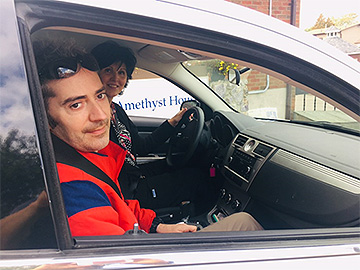News
Taking Steps to Healthy Living and More Independence at Amethyst House
Date: 2019-09-17
Amethyst House, a high support housing site, provides staffed support to help people living with mental illness to live more independently and achieve their goals.
Tall, cheerful sunflowers sway in the breeze outside Amethyst House. Inside, bright paintings line the hallways, and in the shared kitchen, carrots, cucumbers and tomatoes, harvested from the on-site garden, are piled tidily on the counter. Amethyst House is one of St. Joseph’s Care Group’s four high support homes, which are homes designed to help people living with severe and persistent mental illness set and meet their goals around independence and healthy living. Each of Amethyst House’s 12 clients have their own room and share common areas like the kitchen and dining room. The home is staffed by a Registered Nurse, Registered Practical Nurses (RPNs), Community Support Assistants (CSAs) and Leisure Life Skills Instructors (LLSI). Clients pay rent and are responsible for their own personal belongings, clothing, medical equipment and a portion of the grocery bill.
“I really like it here,” says Dan, who has been at Amethyst House since it opened in August 2018. Dan’s been living with a mental health condition for much of his adult life, and after time in his parents’ home and then his own apartment, he became a client of Lakehead Psychiatric Hospital and later St. Joseph’s Hospital. He’s now happy to call Amethyst House his home as he works towards his goal of living on his own again. “Living here means you see the light at the end of the tunnel; you set goals to ‘graduate.’” One of his goals is learning how to cook a week’s worth of healthy meals, and he’s proud of mastering a meatball recipe, working with one of the CSAs. Each client takes turns assisting with the household meals and is also responsible for a daily rotation of chores, like dusting, vacuuming, and cleaning their own room. “The staff is great. You can talk to them and they’re happy to help you out,” says Dan.
Staff provides support in a variety of ways, says Lisa Pedri, a RPN at Amethyst House, including managing and monitoring medications, and accompanying clients to medical appointments and leisure activities. “We listen if they need to talk. We’re here to assist and have clients do as much for themselves as they can. If Dan said ‘I want to learn to start taking the bus,’ that’s a goal we would set up. Staff would go along with him to take the bus until he felt comfortable to take it on his own.” They also develop care plans and schedules with the clients—for example, when Dan first moved in, he still spent all his daytime hours at his parents’ home until staff assessed the situation and gently pointed out that being at Amethyst House more often would help him become more independent. Now Dan still visits his parents and extended family several afternoons a week, but also swims at a local pool every weekday, goes walking and snowshoeing with his fellow housemates, takes part in a monthly outing to shoot pool with the House’s men’s group, helps to plant and take care of the vegetable garden and is just more part of the group now.
“Communal living also helps clients work on social skills”, says Lisa, giving an example of a client who didn’t like the state of a shared bathroom, so the staff listened, called a meeting of the affected parties, and then stepped back. The clients talked it out and came to a workable solution. “Staff are here to support but you know what, these clients are friends. That’s what is nice to see, to watch relationships grow,” she says. “The other clients are really cool,” says Dan, adding that spending time with other people who also understand what it’s like to live with mental illness makes a big difference too. “You can relate to each other.”
Mental illness, like any other chronic illness, can have periods of intensity where symptoms are not manageable by the individual alone. For some, their care journey may involve admission to hospital for stabilization, followed by mental health rehabilitation and outpatient supports. “Some clients need a next step, and that’s what we provide,” said Leanne Fonso Galarneau, Clinical Manager of Mental Health Supportive Housing. “High support housing is a welcoming bridge and a home-like environment where people gain independence, learn new skills and form long-lasting peer relationships. It sets people up for success as they work toward living independently.”

